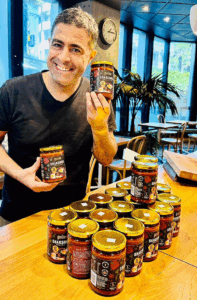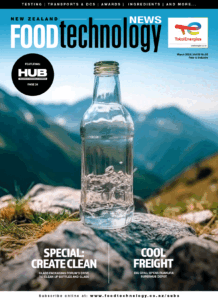
Gus Obeid, owner of Gusstop Kitchen & Café at 21 Pitt St, Auckland Central was born in Gaza Strip, Palestine.
“I made the decision to leave Gaza as a student, in 1994, to head for Australia to study business, and I met my Kiwi wife there. My family is still in Gaza and of course I worry about them every day, but at least my children can sleep safe at night. You can’t under-estimate how that feels,” he says. “Back in 2005, I started a coffee kiosk called Gusstop in Sydney. We were providing consistently high-quality coffee in the CBD, with a very small team pumping out up to 700 cups by 11.30am. However, I’ve been in New Zealand for seven years now, and I brought the Gusstop name across with me.”
Today, Gusstop is a bustling corporate cafe in central Auckland, offering full breakfasts, salads and sandwiches, and using the garden beds located at the back of the café to produce leafy greens to use in the salads and sandwiches prepared daily on the premises. Even for a busy business, it demonstrates the perfect example of garden to plate.
“As a young boy, I used to watch my mother and aunties spend hours in the kitchen creating glorious Middle Eastern meals. This has given me a desire to share food with others and work in hospitality. In my culture, food is everything – it’s how we do business, how we celebrate, how we commiserate. It might sound like a cliché, but food is love.”
The opportunity
Gusstop’s Shakshuka Meal in a Jar was an idea born out of the Covid lockdowns, says Obeid.
“Our revenue at the café took a permanent hit. That was stressful, of course, but it also offered a chance to come up with ideas for how to pivot with the times. The result is a fully pantry-stable product, available from good stores and supermarkets. For breakfast, lunch, or dinner, just add eggs and some great bread, and you’ve literally got a super-healthy gourmet meal in minutes.”
Packaged in a recyclable 545g glass jar, his shakshuka is gluten- and vegan-friendly, letting consumers with different dietary needs tweak the dish with ingredients that suit them. It can be prepared in the traditional Middle Eastern way, with eggs and topped with fresh coriander, or diners can create a vegan option by replacing the eggs with tofu or dairy-free cheese. It also makes a great spicy Italian-style pasta sauce alternative.
Obeid says the goal was to create a cost-effective way to feed four, fast. What’s more, his market research shows it’s popular with all demographics – even children love it.
“When I was five, I knew that shakshuka was the most magnificently delicious dish ever. Even the simplest Middle Eastern dish, like this, is prepared with love and respect for the ingredients and the people who eat it.”
The challenges
Obeid says that once the recipe had been perfected, the café’s food licence had to be changed to allow for this style of product to be manufactured in its commercial kitchen. Now, the business is turning out 500 jars of sauce a week, a volume that could potentially double by implementing some production efficiencies.
“As we expand into more stores and supermarkets, and once we’ve outgrown in-house small-batch production, the plan is to work in with contract manufacturers to increase the amount of sauce being made, to cater for the expanding demand. Also, as it’s an ambient product, it is well-suited for export to Australia as well, which will grow numbers too.”
He says taking the product to market, and scaling production to keep pace, has been no small job.
“We’re currently in Farro Fresh and selected New World stores in Auckland, and Moore Wilson in Wellington and have recently been inundated with inquiries from deli and small to medium size food stores around the country who would like to stock the jar in their stores. We went with Foodstuffs because each shop is independently owned, allowing us to gain traction incrementally and organically. This is more realistic than an ‘everything or nothing’ model – there would have been too much financial risk if we’d gone with one of the bigger brands,” he says. “Once we have more product, we can approach the Woolworths of the world.”
He also plans to target the service industry – restaurants, cafes, rest homes and airlines, for example – with two-litre bottles of the sauce.
“For them, consistency is huge, and that’s our key focus. We offer a specific process that’s easy to follow and it’s got great margin, so it makes good financial sense for that market. It’s also an easy sell for distributors. You could be eating in five minutes and people see that. So, the business plan is to grow without growing bust.”
To that end, Gusstop is looking at reaching a shelf presence in all New World and Pak’nSave stores in Auckland and Hamilton, then expanding into the South Island next year, and to approach Woolworths around mid-2024. The next step will be to head across the Tasman to Australia.
He says the supermarket industry is hard to break into though.
“To start with, anything new is always a challenge – and a risk – for category managers. Fortunately, we attended a Fine Food show earlier this year and caught a lot of attention. Foodstuffs also invited us to participate in its – Emerge Supplier Competition. We didn’t win, but we got into the top five, which gives us good credibility when it comes to approaching stores. We’ve also done an interview on Radio New Zealand as well, which has led to huge feedback in terms of orders. It’s just amazing what that kind of exposure can achieve.”
The question is how to keep up with demand at a sustainable rate.
“Farro Fresh is already selling 25-30 jars a week per store, as is Moore Wilson in Wellington, and this will leap ahead as our distribution continues to increase. However, we’re confident that we


































































































